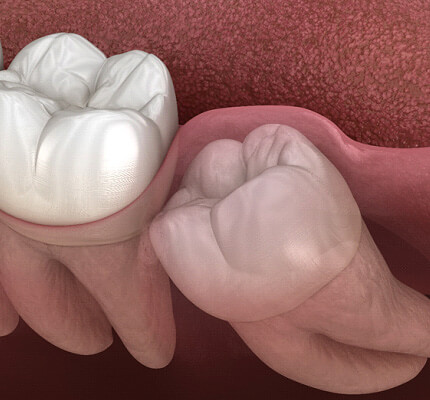Wisdom Teeth Extractions – Fanwood, NJ
Trusted Solutions for Problem Teeth

The wisdom teeth are usually the very last ones to come in, and when they do, they typically only cause problems. Most people simply don’t have enough real estate in their mouth to fit these extra molars, leading them to often become stuck, or impacted. This can cause pain towards the back of the jaw, put pressure on the nearby teeth, and even create a trap for food particles and plaque that make cavities much more likely to develop. Fortunately for local families, our dentists are able to provide safe and effective wisdom tooth extractions right here at Scotch Plains Fanwood Dental Care, enabling patients to get what they need without having to visit an outside specialist.
Why Choose Scotch Plains Fanwood Dental Care for Wisdom Teeth Extractions?
- Multiple Types of Sedation Available
- Patient Comfort Always Comes First
- Better Technology = Better Care
Symptoms You May Need Wisdom Teeth Extraction

Many times, patients need wisdom teeth extraction without even knowing it, which is one of the many reasons why routine checkups are vital. However, you can be on the lookout for these common warning signs that you may need extraction:
- Pain in the back of your mouth
- Tender or bleeding gums
- Red or swollen gums
- Jaw pain
- Swelling around the jaw
- Difficulty opening your mouth
- An unpleasant taste in your mouth
- Bad breath
If you notice any of these symptoms or have tooth pain, call our office right away. One of our experienced dentists will carefully examine your mouth and may even take X-Rays before recommending extraction.
What to Expect During Wisdom Teeth Extraction

Our normal approach is to keep an eye on the wisdom teeth during a patient’s routine checkups so we can hopefully remove them before they cause any symptoms. When it’s time for them to come out, our dentists will start by thoroughly numbing the mouth with a local anesthetic. Once a patient can’t feel anything, they’ll remove any gum or bone tissue that is still housing the tooth before extracting the tooth itself. They will then close the treatment site with self-dissolving stitches. A little swelling and bleeding are common after this procedure, but most patients are able to resume their normal diet and routine within a week.
Post-Operative Tips for Recovery

After your wisdom teeth have been extracted, it’s important to follow our aftercare instructions to ensure a smooth recovery. Take your medication as prescribed to manage pain and prevent infection. Stick to liquids and avoid straws right after your extraction. However, you can start working softer foods into your diet like mashed potatoes or other purees. During this time, you should also apply gauze to promote clotting and healing. You can also use a cold compress or ice pack, alternating on and off of the extraction site area.
Be sure to give yourself a few days off of work or other activity to ensure a proper recovery. Many patients choose to have their extraction done on a Friday, so they have the weekend to rest. It’s vital to your oral health to maintain your regular brushing and flossing routine but avoid the extraction sites to maintain the healing process.
If you have any questions or want to schedule a consultation regarding your wisdom teeth, call our office today to get started!
Understanding the Cost of Wisdom Tooth Extractions

If your wisdom teeth are causing you pain, you will naturally want to have them removed as quickly as possible. Before you commit to the treatment, however, you should make sure that you know what to expect in terms of cost. Our team can give you an estimate of how much you can expect to pay for the wisdom tooth extraction procedure. We can also make sure that you’re fully aware of your options for making the procedure more affordable.
Factors That Can Impact the Cost of Wisdom Tooth Extractions

Not all wisdom tooth extractions come with the same price tag. For one thing, the number of teeth being removed can have a significant influence on the amount that you end up paying. Most patients will have all four wisdom teeth removed at once, but others might have them taken out one at a time, and some may not even have a full set of four wisdom teeth to begin with.
Additionally, the complexity of the procedure needs to be taken into account. If the tooth in question is impacted, it will typically be more costly to remove compared to a tooth that has managed to erupt.
There’s also the matter of sedation to consider. Some individuals are particularly nervous about having a wisdom tooth extraction performed and choose to have dental sedation administered to soothe their anxieties. If you undergo dental sedation, it will be added to the overall cost of the procedure.
Does Dental Insurance Cover Wisdom Tooth Extractions?

The answer to this question is typically yes; most dental insurance plans will indeed pay at least part of the overall cost of a wisdom tooth extraction. Coverage could be anywhere from 50% to 80%. The exact percentage can vary based on which plan you have as well as the specifics of your situation.
You should review your dental insurance policy carefully so that you know what to expect when it comes to wisdom tooth extractions. If there’s anything you’re uncertain about, our team can take a look at your plan and give you tips for maximizing your benefits. Rest assured that we can handle the process of filing any necessary claims, giving you less paperwork to worry about.
How to Make Wisdom Tooth Extractions Affordable

We’re more than happy to accept all PPO dental insurance plans. However, we recognize that not all of our patients have dental insurance. Luckily, there is also the option of signing up for our in-house dental plan. All you need to do is pay a flat fee, and in exchange, you will enjoy discounts on various services. You won’t have to deal with many of the headaches that come with traditional dental insurance, such as deductibles. Please let our team know if you’re interested in learning more about our in-house dental plan.
Wisdom Tooth Extractions FAQs
Why Do We Have Wisdom Teeth?
It seems like wisdom teeth cause nothing but issues. However, they actually benefited our early human ancestors! Early humans subsisted on a diet of raw foods, like meat, berries, nuts, roots, and leaves. They didn’t cut up their food or even cook it! Chewing these foods required a broader jaw with strong molars. Back then, their large jaws easily accommodated the wisdom teeth, so they rarely caused issues. Today, we eat softer foods that are cooked, baked, cut, or otherwise prepared. This makes the wisdom teeth no longer necessary. On top of that, our jaws aren’t as wide as they used to be, so the wisdom teeth can cause issues when erupting. Ultimately, it is best for many patients to have these molars extracted so they don’t lead to complications.
Does Everyone Have Wisdom Teeth?
Most people have four wisdom teeth that erupt in late adolescence or early adulthood. However, some people are missing wisdom teeth and others aren’t born with any at all! In a 2015 article published by the Dental Research Journal, it is estimated that anywhere from 5% to 37% of people are missing one or more of their wisdom teeth. It is unknown why some people don’t develop all of their third molars, but genetics likely play a role. If one of your parents is missing wisdom teeth, this may apply to you as well. A dental X-ray is the best way to tell how many wisdom teeth you have.
Is Wisdom Tooth Removal Painful?
The first step when removing wisdom teeth is to numb the mouth with a local anesthetic. You will also most likely be sedated, lowering your body’s ability to register pain. You can expect the procedure to be completely painless. However, you will likely experience some soreness for several days afterward as you recover. By closely following your dentist’s aftercare guidelines, you should feel back to your normal self within a week.
How Long Does Wisdom Tooth Surgery Take?
Regardless of how long your procedure takes, it will feel like barely any time has passed at all if you are going to be sedated. On average, it takes about 15 to 20 minutes to extract each tooth. Removing all four can take up to 90 minutes. The time that it will take varies depending on the tooth’s location, position, and whether it is impacted. During your consultation, we can give you a more specific estimate so you can plan accordingly.
